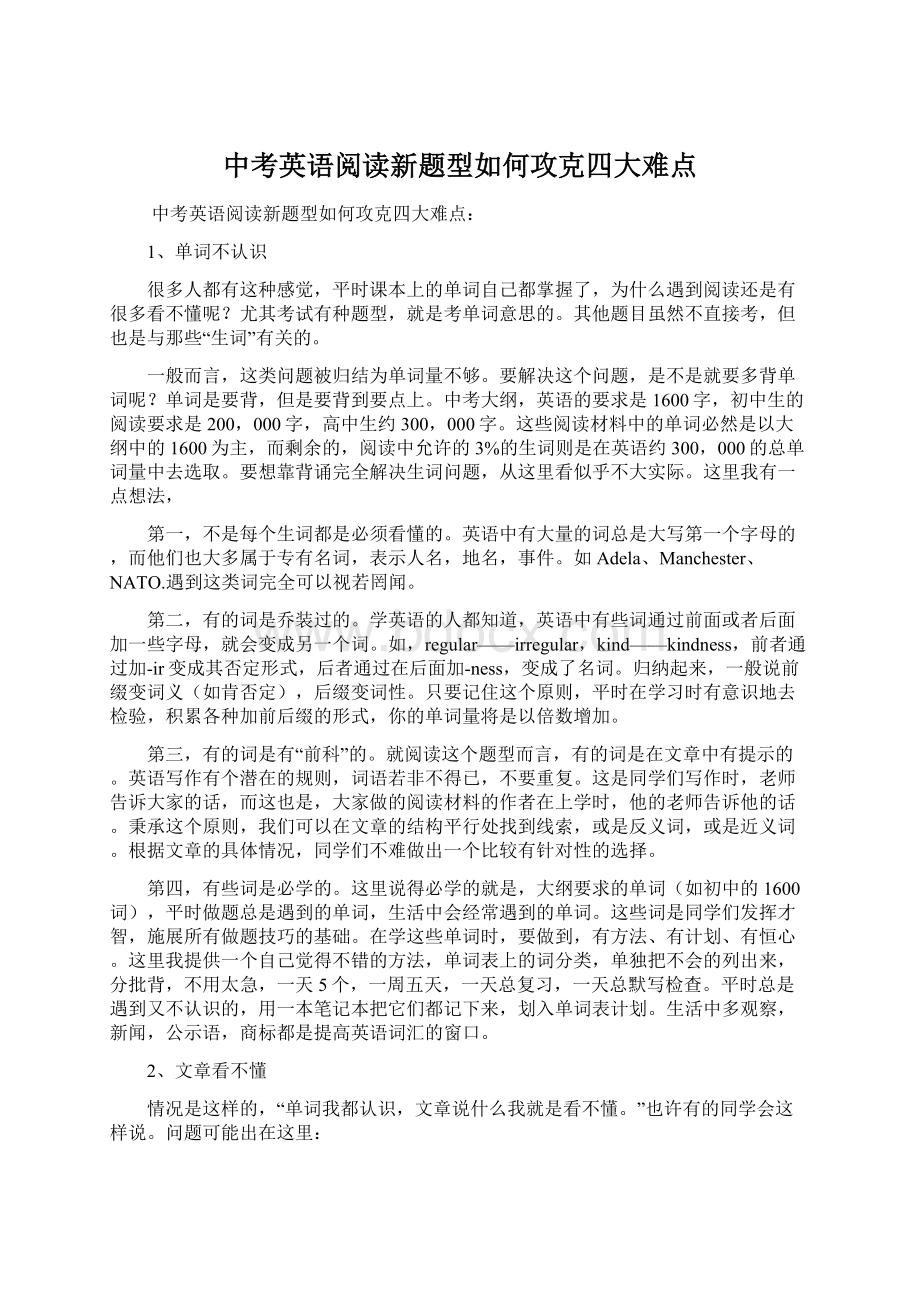中考英语阅读新题型如何攻克四大难点.docx
《中考英语阅读新题型如何攻克四大难点.docx》由会员分享,可在线阅读,更多相关《中考英语阅读新题型如何攻克四大难点.docx(9页珍藏版)》请在冰豆网上搜索。

中考英语阅读新题型如何攻克四大难点
中考英语阅读新题型如何攻克四大难点:
1、单词不认识
很多人都有这种感觉,平时课本上的单词自己都掌握了,为什么遇到阅读还是有很多看不懂呢?
尤其考试有种题型,就是考单词意思的。
其他题目虽然不直接考,但也是与那些“生词”有关的。
一般而言,这类问题被归结为单词量不够。
要解决这个问题,是不是就要多背单词呢?
单词是要背,但是要背到要点上。
中考大纲,英语的要求是1600字,初中生的阅读要求是200,000字,高中生约300,000字。
这些阅读材料中的单词必然是以大纲中的1600为主,而剩余的,阅读中允许的3%的生词则是在英语约300,000的总单词量中去选取。
要想靠背诵完全解决生词问题,从这里看似乎不大实际。
这里我有一点想法,
第一,不是每个生词都是必须看懂的。
英语中有大量的词总是大写第一个字母的,而他们也大多属于专有名词,表示人名,地名,事件。
如Adela、Manchester、NATO.遇到这类词完全可以视若罔闻。
第二,有的词是乔装过的。
学英语的人都知道,英语中有些词通过前面或者后面加一些字母,就会变成另一个词。
如,regular——irregular,kind——kindness,前者通过加-ir变成其否定形式,后者通过在后面加-ness,变成了名词。
归纳起来,一般说前缀变词义(如肯否定),后缀变词性。
只要记住这个原则,平时在学习时有意识地去检验,积累各种加前后缀的形式,你的单词量将是以倍数增加。
第三,有的词是有“前科”的。
就阅读这个题型而言,有的词是在文章中有提示的。
英语写作有个潜在的规则,词语若非不得已,不要重复。
这是同学们写作时,老师告诉大家的话,而这也是,大家做的阅读材料的作者在上学时,他的老师告诉他的话。
秉承这个原则,我们可以在文章的结构平行处找到线索,或是反义词,或是近义词。
根据文章的具体情况,同学们不难做出一个比较有针对性的选择。
第四,有些词是必学的。
这里说得必学的就是,大纲要求的单词(如初中的1600词),平时做题总是遇到的单词,生活中会经常遇到的单词。
这些词是同学们发挥才智,施展所有做题技巧的基础。
在学这些单词时,要做到,有方法、有计划、有恒心。
这里我提供一个自己觉得不错的方法,单词表上的词分类,单独把不会的列出来,分批背,不用太急,一天5个,一周五天,一天总复习,一天总默写检查。
平时总是遇到又不认识的,用一本笔记本把它们都记下来,划入单词表计划。
生活中多观察,新闻,公示语,商标都是提高英语词汇的窗口。
2、文章看不懂
情况是这样的,“单词我都认识,文章说什么我就是看不懂。
”也许有的同学会这样说。
问题可能出在这里:
第一,单词不是真的都认识。
其实也不难理解,大家打开字典,会发现几乎每一个单词都不是只有一个释义。
有这样问题的同学所说的认识,也许只是这些单词的一个意思,有可能在文段中考查的是它的另一个意思。
这类情况,我们称为“熟词生义”。
要解决它,就把它当个生词来处理就行了。
唯一不同的是,同学们对这类词的处理要更注重在语境中理解,这样才能更好地区分不同词义。
第二,语法句式不熟。
这个原因更普遍一些。
阅读中的句子有的是很长的,有的是很怪异的。
长的可能是加了从句(主语从句、宾语从句、定语从句、状语从句),怪的则有可能是倒装,悬垂修饰,插入语,这些语法点。
解决这个就是要解决语法弱项,认真学好每个语法现象,多去用学过的语法去分析英语句子,久而久之就会很快地反应出是什么语法现象了。
第三,没看到重点。
现在中学英语考试中的文章还是有规律的,它们基本上都是段首写该段的中心,后面论述。
文章则是第一段,最后一段容易提出作者的观点。
在处理好这些部分外,还要注意文段中表示转折的句子,其标志词常常是but,while,however,inspiteofthis等。
3、文章看不完
考试时时间总是过得太快,阅读又经常是花时间最多的题型。
在我自己上学过程中不管是平时的测验,还是中考,高考,交卷时总有同学还在忙着从阅读没做完的遗憾中醒来,匆忙地把答案写在答题卡上。
要是问起原因,得到的答案大多数都是,“阅读花了太多时间。
”提高阅读速度大致有这样几条小建议:
第一,平时多读,多读好处有很多,如
(1)考试时能够不紧张,以平和的心态,正常的速度完成。
(2)总结做题技巧,如定位法,上下文联系法,排除法等。
(3)提高反应速度,我们看到一个生词需要花一定的时间去反应,当一个人经常见到某个词时,他对这个词的反应速度必定会很快。
假如一个词的反应时间能通过多读缩短0.1秒,一篇文章会节省多少时间,一份试卷,有能节约多少时间呢?
第二,考试时少读。
考试时的阅读如果归类于平时练习的题型,它更侧重泛读。
考试考察的是同学们在规定时间内找到要求的信息的能力,不是复述文章细节的能力。
那考试时读什么呢?
大致有一下几类:
(1)中心句,中心段(首尾)。
(2)转折句。
(3)问题中出现的词,尤其是一些很有特点的词,如专有名词。
在文段中快速找到相应词语所在位置。
问题的答案往往就在附近。
也许这也像是一句老话那样,“毒蛇出没的地方,七步之内必有解药。
”
第三,平时多去积累不同题型的解决方法。
如细节题——定位法,观点题——中心句法。
在考试中遇到题目,能够对症下药。
4、题目做不对
考试后,总会有同学说,“文章我都看懂了,怎么还错这么多呀?
”这时候与其去怀疑答案的权威性,还不如静下心好好分析一下,我真看懂了吗?
我看懂的是问题问的内容吗?
如果没真的看懂,是什么原因,如果是上面三条之一,不妨试试上面的一些方法。
如果真看懂了,那么看懂的是不是考卷要考察的内容呢?
我们总会有这种心理,在看懂了一些不是很容易看懂的东西后,就很有成就感,就突然觉得这篇文章我理解了,然后就会在自己的理解和诠释下答题。
这时候是最容易出错的,因为这时候我们已经不是在做客观题,而是做主观题。
阅读考查的是读者对作者意图的接受程度,这就要求同学们身于其中,有置于其外。
不能有太多的发挥。
如果都不是,那么就要问问自己题目看懂了吗?
考试有些题目稍不留心就会看错,最常见的就是,Accordingtothepassage,whichofthefollowingstatementsisnottrue?
同学们在考场上很容易就看错。
A
Henrywasanofficeworkerinabigcity.Heworkedveryhardandenjoyedtravelinginhisholidays.
Heusuallywenttotheseaside,butoneyearhesawanadvertisementinanewspaper.“Enjoycountrylife.SpendafewweeksatWestHillFarm.Goodfood.Freshair.Horseriding.Walking.Fishing.Cheapandinteresting.”
“Thissoundsagoodidea,”hethought.“I’llspendamonthatWestHillFarm.IthinkIcanenjoyhorseriding,walkingandfishing.They’llmakeachangefromsittingbytheseasideandswimming.”
Hewrotetothefarmer.IntheletterhesaidthathewouldliketospendallofJulythere.ThenonthefirstofJuly,heleftforWestHillFarm.
Butfourdayslater,hereturnedhome.
“WhatwaswrongwithWestHillFarm?
”hisbestfriend,Ed,askedhim.“Didn’tyouenjoycountrylife?
”
“Countrylifewasverygood,”Henrysaid.“Buttherewasanotherproblem.”
“Oh.What?
”
“Well,”hesaid,“thefirstdayIwasthereasheepdied,andwehadroastmuttonfordinner.”
“What'swrongwiththat?
”Edasked.“Freshmeatisthebest.”
“Iknow,butontheseconddayacowdied,andwehadroastbeeffordinner.”
“Luckyyou!
”
“Youdon'tunderstand,”Henrysaid.“Onthethirddayapigdiedandwehadroastporkfordinner.”
“Adifferentmeateveryday,”Edsaidloudly,“andyouarecomplaining!
”
“Letmefinish,”Henrysaid.“Onthefourthdaythefarmerdied,andIdidn'tdare(敢)stayfordinner!
”
1.HowdidHenryfindoutaboutthefarm?
A.Hesawitinanewspaperadvertisement.B.Hisbestfriendtoldhim.
C.Hewrotetothefarmer.D.Maybehelearneditfromtheradio.
2.Henrycamebackhomeseveraldayslaterbecause______________.
A.hedidn'tlikethecountrylifeatallB.thefarmerwasn’tfriendlytohim
C.hisholidaywasoverD.hethoughthemighthavetoeatthefarmer
3.“…andyouarecomplaining!
”,theword“complain”means__________.
A.夸奖B.说三道四C.抱怨D.故弄玄虚
4.Whichofthefollowingsentencesistrue?
A.Edcouldeatadifferentkindofmeateveryday.
B.Henrythoughthecouldenjoyachange.
C.Henrycouldn'tthinkofanythingelsetodo,sohewenttothefarm.
D.Thefarmerdiedbecauseofthebadmeatheate.
5.Whichisthebesttitleforthepassage?
A.Whatabeautifulfarm!
B.Haveagoodtime.
C.AshortholidayD.Henryandthefarmer.
B
Youmustbefamiliarwiththesituation:
Dad’sdriving,Mum’stellinghimwheretogo.He’s
surethattheyneedtoturn1eft.Butshesaysit’snotforanothertwoblocks.Whohasthebetter
senseofdirection?
Menorwomen?
Theybothdo,anewstudysays.butindifferentways.
Menandwomen.Canadianresearchershavefound,havedifferentmethodsoffindingtheir
way.Menlookquicklyatlandmarksf地标)andheadoffinwhattheythinkistherightdirection
Women.however.trytopicturethewholerouteindetailandthenf01lowthepathintheirhead,
“Womentendtobemoredetailed.”saidEdwardCornell,wholedthestudy。
“whilemen
tendtobealittlebitfasterand…alittlebitmoreintuitive(直觉感知的)”
Infact.saidCornell.“senseofdirection”isn’toneskillbuttwo.
Thefirstisthe“surveymethod,’.Thisiswhenyouseeanareafromabove,suchasaprinted
mapYoucansee.forexample,wherethehospitalis,wherethechurchisandthatthe
supermarketisonitsright
Thesecondskillisthe“routemethod”Thisiswhenyouuseaseriesofdirections.Yonstart
fromthehospital.thenturn1eft.turnright,gouphill—andthenyouseethesupermarket.
Menaremorelikelytousethesurveymethodwhilewomenaremorelikelytouseoneroute
andfollowdirections
Bothwork.andneitherisbetter
Somescientistsinsistthatthesedifferentskillshavealonghistory.Theyargueitisbecause
ofthedifferenceintraditionalroles.
Inancienttimes.youngmenoftenwentfarawaywiththeoldermentofishorhuntThetrip
tookhoursordaysandcoveredunfamiliarplaces.Theonlywaytoknowwhereyouwerewasto
usethesurveymethodtorememberlandmarks—themountains.the1akesandsoon.
Thewomen,ontheotherhand,tookyounggirlsouttofindfruitsandplants.These
activitiesweremuchclosertohomebutrequiredlearningwell—usedpaths.So,women’ssenseofspacewasbasedonlearningcertainroutes
1WhenfindinghiswayDadtendstorelyon_______
Ahisintuitiveknowledge
Bhisbookknowledge.
CMum'sassistance.
Dthepolice'sassistance,
2Womenaremorelikelytouse________
Athesurveymethod
Bthetraditionalmethod.
Ctheroutemethod
Dtherightmethod.
3Whichworksbetter,theroutemethodorthesurveymethod?
AThesurveymethod
BTheroutemethod.
CEither.
DNeither
4WhichofthefollowingisNOTalandmark?
AAlongriver.
BAhighmountain.
CAmagnificentchurch
DApathinyourhead
5Womendevelopedasenseofspaceoutoftheneed
Atogofishing.
Btogohunting.
Ctolearnwell-usedpaths.
Dtogoswimming
C.
Asweknow,XiaoShenyangandLiuQiandidwonderfuljobsintheCCTVSpringFestivalGala.Nowmanypeoplearecrazyaboutthesetwopersons.Buthowmuchdoyouknowaboutthem?
XiaoShenyangwasborninapoorpeasantfamilywhichisindifficultfamilyconditions.HisrealnameisShenHe.Heisanactor.HeisgoodatErRenZhuan.Helearnedacts,followingZhaoBenshan.Duringtheschoollife,hewasveryactiveinmanyactivities.Helookslikeasimpleman,butheneverstopspursuing(追求)hisartisticaspiration(渴望).Moreandmorepeoplelikehisstyleofperformance,andwehopehecanmakegreatprogressinthefuture.
LiuQianisayoungmagicianfromTaiwan.Attheageof7,Liusawacutemagictoyinashop.Atthatmomenthebegantoloveanddecidedtolearnmagic.Liudidn’tgotoanymagicschool.hepracticedtrickseverydaytoimprovehisskills,untilonedayhewasabletoputonashowforhisclass.Hesawthesurpriseoneveryone’sface,andhefeltitwascool.Heoftendoesstreetshowsforpassers-by,policeandfarmers.Heworkedhardatit.Nowheisafamousmagician.
XiaoShenyang
LiuQian
Job
Anactor
AyoungmagicianfromTaiwan
Howtosucceed
Helearnedacts,followingZhaoBenshan.
Duringtheschoollife,he2.__________.
Helookslike4.___________.Butheneverstopspursuingtheartisticaspiration.
Healwayslearnedmagic1.__________atthebeginning.
Athisshowforhisclass,hefoundeveryone3._______________andhefeltitwascool.
Heoftendoesstreetshowsforpeople.Heworkshardatit.
D.
“Lifeisspeedingup.Everyoneisgettingunwell.”
Thismaysoundlikesomethingsomeonewouldsaytoday.Butinfact,anunknownpersonwholivedinRomeinAD53wroteit.
Wealllovenewinventions.Theyareexciting,amazingandcanevenchangeourlives.
Buthaveallthesedevelopmentsreallyimprovedthequalityofourlives?
Picturethis.You’rerushingtofinishyourhomeworkonthecomputer.Yourmobilephonering;aQQmessagefromyourfriendappearsonthescreen;thenoisefromthetelevisionisgettinglouderandlouder.Suddenlythecomputergoesblankandyouloseallyourwork.Nowyouhavetostayupallnighttogetitdone.Howhappydoyoufeel?
Inventionsha